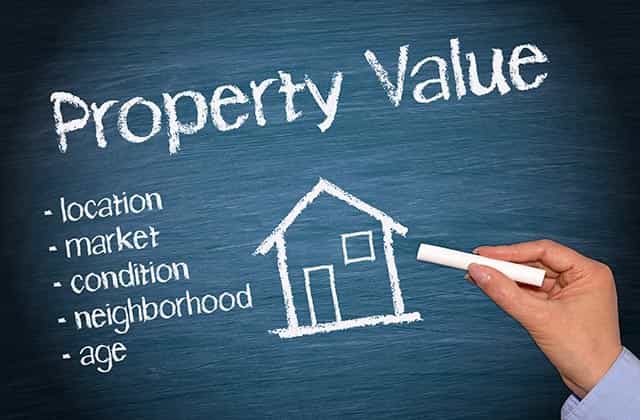[et_pb_section bb_built=”1″ _builder_version=”3.0.47″][et_pb_row _builder_version=”3.0.48″ background_size=”initial” background_position=”top_left” background_repeat=”repeat”][et_pb_column type=”4_4″][et_pb_text _builder_version=”3.18.2″]
How Much is My Farmington Hill MI Home Worth? 6 Factors That Influence Home Value: Determining the appropriate asking price for your Farmington Hills MI home is vital for a successful sale. Even if you have experience in the Farmington Hills / Oakland County MI real estate market, home prices can differ substantially from initial evaluations. Effective home valuations make the home selling process faster and less stressful, and knowing the right value of your home can help you secure a better deal.
Get a Free Home Valuation Now!
It’s easier to avoid common home selling mistakes when you are aware of the factors that influence your home’s value, and pricing your Farmington Hills MI property correctly from the beginning is key. If you overprice your home, you could lose potential buyers that are actually in your price range. Your home will not be attractive to buyers in the higher price range compared to other similarly priced homes they are viewing.
The last thing you want is to have your property linger on the market and can create the vibe among buyers that there’s something wrong with it, otherwise known as a “stale listing.” Pricing your home too low may cause it to sell fast, but for less money than you would have received if priced at market value.
Six key factors to consider when pricing or valuing Farmington Hills home for sale include comparable homes (comps), quality of the neighborhood, the market, nearby features, size and appeal, and age and condition of the home:
1). Comparable Homes or “Comps”
One of the best indicators of your home’s value is the sale prices of similar homes in your neighborhood that have sold recently. These comparable homes are often referred to as “comps.” Most real estate experts will rely on comps to estimate a home’s value and will consider recency, similarity, distance, and location:
- Recency – homes that were sold recently or within the last 90 days
- Similarity – homes that are most similar to your property in terms of features such as year built, two-story vs. ranch, number of bedrooms, bathrooms, basement, square footage
- Distance – homes in the same subdivision or sold within a one-mile radius of your property
- Location – homes with the same placement such as on a busy street, cul-de-sac, golf course, or waterfront.
Agents will look into the difference between each comp’s listing price, and the price it sold for. Your agent will also rely on inside knowledge of housing inventory and the local market. That nuanced understanding is invaluable, particularly when measuring the unique aspects of your home with raw data about comps. They find these homes using the multiple listing service (MLS), a regional database of homes that agents pay dues to access.
2). The Neighborhood
The neighborhood where the house is located will have an impact on a home’s value, responsible for both qualitative and quantifiable aspects of a home’s appeal. For example, school quality significantly affects home values and families often choose the location of their next home by where their children will go to school.
According to the National Bureau of Economic Research, there is a definite correlation between school expenditures and home values in any given neighborhood. A report titled, “Using Market Valuation to Assess Public School Spending,” found that for every dollar spent on public schools in a community, home values increased $20.
On the other hand, if your property is the only house on the block that’s in great condition, or there are neighbors that have unkempt lawns, or other visual disturbances, then the value of your home could decrease. According to the Appraisal Institute, a bad neighbor could potentially reduce your home’s value by up to 10%. This sort of effect is referred to as external obsolescence, where external factors have an effect on your home’s value, instead of factors on your property that can cause a decrease.
3). The Local Market
The current state of the housing market will have an impact on your home’s value. Home prices are shaped by supply and demand and may fluctuate based on subtle changes in your area’s economy. Even if your home is in excellent condition and in a stellar location, the number of other properties for sale in your area and the number of buyers in the market can impact your home’s value.
If you’re buying in a buyer’s market, you’ll likely have more room to negotiate on the home’s price. If you’re selling in a buyer’s market, you may have to adjust the price to attract more offers or be willing to make concessions to a seller, like paying closing costs, covering repairs, or being more flexible with the timeline.
4). Home Size and Appeal
When estimating a home’s market value, size is an important element to consider, since a bigger home can positively impact its valuation. The value of a home is roughly estimated by price per square foot (the sales price divided by the square footage of the home). For example, a 2,000 square foot house that sold for $200,000, the price per square foot would be $100. However, the price buyers will pay per square foot can vary greatly depending on the location of the home.
Usable space also matters when determining a home’s value. Garages, attics, and unfinished basements are generally not counted in usable square footage. Bedrooms and bathrooms are most highly valued, and the more beds and baths your home has, the more it will typically increase in value.
5). Home Age and Condition
In addition to size and appeal, you’ll need to think about the home’s age and condition. Typically, homes that are newer will sell for more than older homes because they will typically require less maintenance. Critical components like electrical, plumbing, appliances, and roofing are less likely to need repairs or replacement and can translate to savings for a buyer.
However, an older home that’s been well-maintained may sell for just as much as a newer home. Condition matters. A home’s foundation, structural integrity, electrical work, plumbing, and fixtures are all items worth considering.
6). Location in Relation to Nearby Features
Location can be more important than even the size and condition of the house when determining how much value to assign based on the location of the property. According to Inman, there are three primary indicators when assigning value: the quality of local schools, proximity to employment opportunities, and proximity to shopping, entertainment, and recreational centers.
These factors can influence why some neighborhoods command steep prices and why others that are only a few miles away don’t. In addition, a location’s proximity to highways, utility lines, and public transit can also impact a property’s overall value.
Keep the above factors in mind when pricing your home to help attract serious buyers and to prevent long days on market, which ultimately come at a cost. Even after the listing date, price should be an ongoing discussion between you and your agent. Markets are fluid, so you may have to make some tweaks when all is said and done.
Ready to Sell Your Farmington Hills MI Home? Partner with Top-rated Farmington Hills MI REALTOR – Tom Gilliam
Top-rated Farmington Hills REALTOR® – Tom Gilliam has over two decades of experience helping home buyers and sellers realize their dreams in Farmington Hills MI and the surrounding Oakland County area. Tom offers in-depth local market knowledge and employs the latest technology and the most cutting-edge approaches to marketing your home to get it in front of as many qualified buyers as possible.
You can be assured that Tom is 100% committed to getting your home sold as quickly as possible and for the highest market price. For more information about buying or selling Farmington Hills MI real estate, please contact Tom directly at (248) 790-5594 or get in touch with him here!
Tom Gilliam, REALTOR®
RE/MAX Classic
29630 Orchard Lake Rd.
Farmington Hills 48334
Direct: 248-790-5594
Office: 248-737-6800
Email: Tom @ Homes2MoveYou.com
License #314578
[/et_pb_text][/et_pb_column][/et_pb_row][/et_pb_section]

